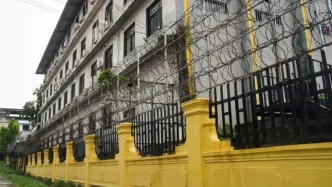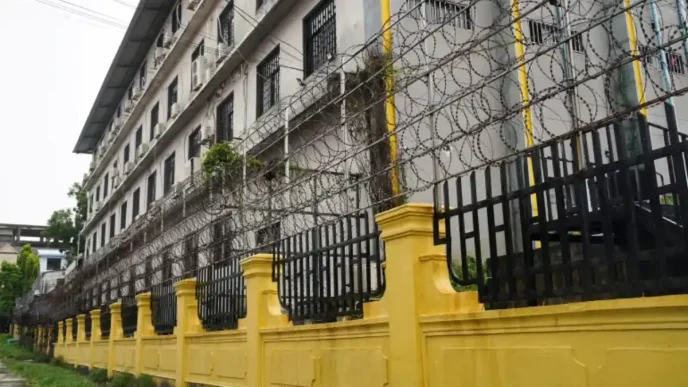Malaysia has called for stronger regional cooperation to tackle mounting maritime security challenges in the South China Sea, a region increasingly fraught with geopolitical tensions and territorial disputes. Speaking at the ASEAN Defence Ministers’ Meeting (ADMM) retreat in Penang, Defence Minister Datuk Seri Mohamed Khaled Nordin underscored the urgent need to uphold international law and prevent the resource-rich waters from becoming a battleground for rival powers.
“The South China Sea, in particular, is a high-pressure zone and a site of geopolitical power struggles,” Mohamed Khaled said during the opening session at the Shangri-La Rasa Sayang Resort and Spa in Batu Ferringhi. “Malaysia aims to prevent conflicts while ensuring freedom of navigation and passage in the region.”
The three-day meeting, which began on 26 February and includes over 150 delegates from 10 ASEAN member states, Timor-Leste, and the ASEAN Secretariat, seeks to address shared security concerns across the region. Chaired by Mohamed Khaled, the retreat has placed maritime security at the forefront, alongside other pressing issues such as artificial intelligence (AI) in defence, humanitarian disaster relief, defence industry collaboration, and non-traditional threats like terrorism and biosecurity.
South China Sea: A Persistent Flashpoint
The South China Sea remains one of the world’s most contested maritime zones, with overlapping claims from China, Vietnam, the Philippines, Malaysia, Brunei, and Taiwan. The region is not only a vital artery for global trade—carrying an estimated $3.4 trillion in trade annually—but also holds significant reserves of oil and natural gas. Its strategic importance has drawn international attention, with major powers like the United States and China frequently engaging in military posturing, heightening the risk of accidental conflict.
Malaysia’s proposal at the ADMM retreat focuses on minimising military asset deployments in disputed areas and fostering dialogue to ensure stability. “We must work together to uphold international law and prevent the South China Sea from becoming a contest for rivalries,” Mohamed Khaled emphasised. While he did not single out any specific nation, the remarks come amid ongoing tensions over China’s expansive claims and its construction of artificial islands equipped with military infrastructure.
Analysts suggest Malaysia’s stance reflects a broader ASEAN desire to manage the issue collectively, though the bloc has historically struggled to present a unified front. “ASEAN countries are caught between economic reliance on China and security concerns tied to its actions in the South China Sea,” said Dr. Siti Aminah Rahman, a regional security expert based in Kuala Lumpur. “Malaysia’s push for cooperation is pragmatic, but achieving consensus among member states with divergent interests will be challenging.”
If successful, such initiatives could reduce the likelihood of escalations, though sceptics note that without enforceable mechanisms, the impact may remain limited. As of now, no concrete agreements have been announced, and discussions are set to continue over the coming days.
Technology and Security: The Double-Edged Sword of AI
Beyond maritime issues, Mohamed Khaled highlighted the transformative potential—and risks—of emerging technologies in the defence sector. “We know that AI and other emerging technologies will be a common feature in the use of the defence sector,” he said. “While they will greatly bolster security efforts and enhance efficiency, if left unchecked, they could also pose risks to any country.”
The minister’s comments point to a growing recognition within ASEAN of AI’s dual nature. On one hand, AI-driven surveillance and predictive analytics can enhance border security and counter-terrorism efforts. On the other, unchecked development or misuse could lead to privacy violations, autonomous weapon proliferation, or cyber vulnerabilities. The proposal to address cybersecurity alongside AI signals an intent to establish regional guidelines, though specifics remain under wraps.
For ASEAN nations, many of which are in the early stages of integrating advanced technologies into their defence frameworks, the challenge lies in balancing innovation with regulation. “The risk of AI misuse is not hypothetical,” noted tech policy analyst Jeremy Tan. “Without clear ethical standards, we could see these tools weaponised in ways that undermine regional stability.”
Humanitarian and Disaster Relief: A Unified Response to Climate Threats
Another key focus of Malaysia’s agenda at the ADMM retreat is the creation of a dedicated humanitarian and disaster relief team among ASEAN countries. Mohamed Khaled pointed to the increasing frequency of natural disasters driven by climate change, citing events like typhoons in the Philippines as evidence of the need for a coordinated response.
“With climate change, natural disasters are becoming more frequent, with events that were once rare now occurring regularly in the ASEAN region,” he said. While some ASEAN countries already collaborate on peacekeeping forces, the minister proposed expanding this model to include all member states in disaster relief efforts.
The initiative could prove vital in a region prone to floods, earthquakes, and tropical storms, where national resources are often stretched thin during crises. A unified team might enable faster deployment of aid and expertise, potentially saving lives and reducing economic losses. However, logistical hurdles—such as funding, training, and interoperability between national forces—remain unresolved and will likely require further negotiation.
Defence Industry and Non-Traditional Threats
Malaysia also seeks to strengthen cooperation in the defence industry, encouraging ASEAN nations to collaborate on research, development, and production of military technologies. Such a move could reduce reliance on external suppliers and bolster regional self-sufficiency, though it may face resistance from countries wary of sharing sensitive capabilities.
Additionally, Mohamed Khaled raised concerns about non-state actors, including terrorist and criminal groups, which he warned could grow into armed threats if not addressed. The inclusion of biosecurity on the agenda reflects emerging fears of pandemics or biological attacks, issues that have gained prominence since the COVID-19 crisis.
“We know about terrorist groups and criminal groups involved in various illicit activities, and they may, at some point, become stronger,” the minister cautioned. While ASEAN has existing frameworks to combat transnational crime, such as the ASEAN Ministerial Meeting on Transnational Crime (AMMTC), integrating these efforts with defence strategies could mark a significant shift in approach.
A Path Forward for ASEAN?
The ADMM retreat in Penang represents a critical opportunity for ASEAN to address both traditional and emerging security challenges. Malaysia’s leadership on issues like the South China Sea, AI, and disaster relief underscores its commitment to regional stability at a time of profound uncertainty. Yet, the effectiveness of these proposals will depend on the willingness of member states to prioritise collective action over national interests—a perennial hurdle for the bloc.
For now, the discussions in Penang offer a glimpse of ASEAN’s evolving security priorities. Whether they translate into actionable policies remains to be seen, but the stakes could not be higher. As geopolitical rivalries intensify and new threats emerge, the region’s ability to forge a united front will be tested like never before.
With the retreat set to conclude on 27 February, all eyes are on whether Malaysia’s call for cooperation will resonate with its neighbours. If it does, ASEAN could take a significant step towards safeguarding its future. If not, the South China Sea—and the broader regional landscape—may remain a theatre of tension for years to come.














